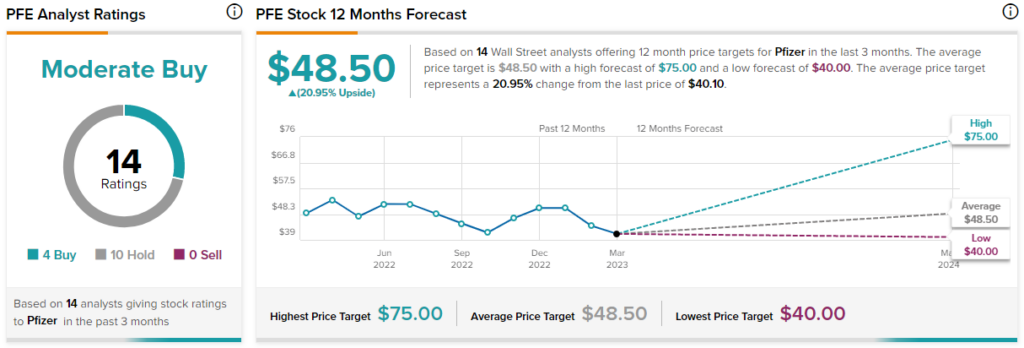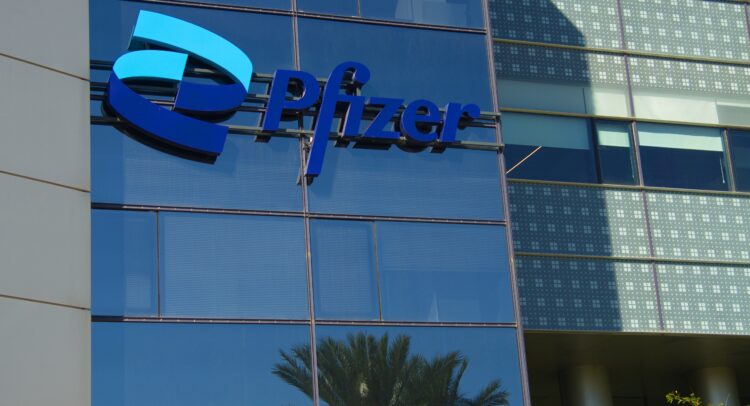It’s been a very nasty slump for shares of Pfizer (NYSE:PFE), which recently touched down with new 52-week lows of around $39 and change per share (now trading at $40.10). The COVID-19 vaccine boom days are over, even if the pandemic isn’t. With that, it will be harder for Pfizer to keep earnings growth going strong. In any case, Pfizer has plenty of tools (like M&A and a robust drug pipeline) it can leverage to help offset looming growth pressures (declining COVID vaccine demand and future patent expiries).
Meet Your ETF AI Analyst
- Discover how TipRanks' ETF AI Analyst can help you make smarter investment decisions
- Explore ETFs TipRanks' users love and see what insights the ETF AI Analyst reveals about the ones you follow.
Further, Pfizer stock’s bearish slump has paved the way for some really low expectations, making Pfizer a compelling value play for contrarians willing to brave the negative momentum. Due to a modest valuation and underrated tools to help offset growth pressures, I remain bullish on Pfizer stock.

Pfizer is Getting Ready for a Post-COVID Environment
The post-COVID overhang has also weighed heavily on Pfizer’s vaccine peer Moderna (NASDAQ:MRNA), which is in a bear market as well. As vaccine demand falls, the price-to-earnings multiples of both companies stand to swell. Lower earnings mean a higher multiple, calling for a reduction in share price.
Despite headwinds in the post-COVID environment, shares of both companies, I believe, have overswung to the downside, especially when it comes to Pfizer, which seems very well-equipped to deal with a slow and steady fall in COVID vaccine demand.
Indeed, Moderna had more to gain compared to Pfizer from its mRNA COVID vaccine. Now that the tables have turned, Moderna has more to lose, at least until it launches its next big blockbuster. Still, it’s been a magnificent run for Moderna’s early investors. Despite the latest 67% peak-to-trough drop, shares are still up nearly 600% since late 2018 when shares went public.
As Pfizer continues exploring options to lessen the impact of its declining COVID business, I think investors should be more willing to give the ailing biopharmaceutical firm the benefit of the doubt.
In recent years, Pfizer has been busy putting its COVID windfall to good use on the M&A front. Most recently, Pfizer made its biggest splash in more than a decade with agreements in place to acquire biotech firm Seagen (NASDAQ:SGEN) for $43 billion.
Wall Street Seems Downbeat on Pfizer’s Seagen Acquisition
The Seagen deal will give Pfizer an extensive roster of cancer treatments. More importantly, Pfizer will gain access to an impressive pipeline and some very impressive talent that could help spark a reacceleration in longer-term growth. Indeed, the “new” Pfizer is still very much focused on growth.
Pfizer CEO Albert Bourla recently remarked that the field of oncology “continues to be the largest growth driver in global medicine.” With Seagen aboard, Pfizer stands out as a firm that will play a role in the world’s fight against cancer.
For now, investors don’t like the deal. The price tag wasn’t cheap, and the company isn’t profitable yet. Regardless, Seagen’s trajectory suggested that the firm was well on its way to moving into profitability at some point in the future. In any case, I view Seagen as in excellent hands with Pfizer as it looks to invest in its future growth drivers. Seagen could prove to be a critical driver in the post-COVID era.
Earlier this month, Jefferies initiated Pfizer stock with a “Hold,” citing the hazy outlook. Pfizer may be prepping for the post-COVID world, but execution and other unknowns make for a rather uncertain story.
Though Jefferies is right to be cautious in the face of such uncertainty, I do think expectations are now muted, with shares trading at a mere 7.3 times trailing earnings or 12 times forward earnings. The 4% dividend yield also looks tempting for a firm that has the means to make a return to the growth track with the help of M&A.
Is Pfizer Stock a Buy, According to Analysts?
Turning to Wall Street, PFE stock comes in as a Moderate Buy. Out of 15 analyst ratings, there are four Buys and 10 Hold recommendations. The average Pfizer price target is $48.50, implying upside potential of 20.95%. Analyst price targets range from a low of $40.00 per share to a high of $75.00 per share.

The Takeaway: Expectations Seem Too Low
Pfizer stock is much-hated right now as it looks for means to offset its stalling COVID business. The firm’s future plans may be a tad hazy, but I think the 35% drop is overdoing it.
Like it or not, Pfizer looks poised to acquire its way to growth. As a pharmaceutical behemoth with a great top boss, Alberta Bourla, I’d say Pfizer is now an intriguing play in a potential recession year.
















